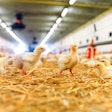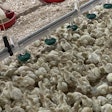
While a product may not be on the market just yet, investments are streaming into the nascent technology of creating meat products using cell cultures.
The product, known as lab-grown meat, in vitro meat, cultured meat or clean meat, is a few years away from the market but there’s already a cadre of startups and investors working on putting a product on a plate and eventually a grocer’s shelf.
The financial question
Some of the technology behind cultured meat products already exists, but a number of hurdles lie between the state of the art today and going to market. The most significant may be the financial obstacle.
A leading researcher in the field, Dr. Paul Mozdziak, a professor in the Prestage Department of Poultry Science at North Carolina State University, said significant investments are needed to set up the infrastructure and to purchase the inputs needed to actually grow the cells. The hope is, he said, the process will continue to be refined and these costs will be reduced due to economies of scale.
The other part of the research equation is funding. Two leading agencies are involved in raising funding for, and awareness of, the technology: New Harvest and the Good Food Institute (GFI).
New Harvest is a New York-based group focused on funding academic research surrounding what it calls cellular agriculture. Erin Kim, the non-profit group’s communications director, said it is currently funding six scientists working on areas like meat, egg products and leather. Mozdziak received research funding from New Harvest.
The GFI is a Washington-based technology accelerator focused on advancing the plant-based and cultured meat sectors. Dr. David Welch, its director of science and technology, said the non-profit employs four scientists who do foundational work in the industry, helps researchers and start-ups find funding and provides some research funding.
Why invest in cultured meat?
Both Kim and Welch said the groups are donor supported. Kim said investors come from a variety of backgrounds and have differing motivations. A large contingent are vegan or animal welfare advocates who want to advance the technology as an alternative to conventional animal agriculture. Another significant portion are techno-optimists and futurists who see it as a way for humanity to develop more food with less resources. Others are venture capitalists who see it as a potentially profitable technology.
Welch said his group is optimistic about the future of cultured meat and sees the technology making great strides within the next 10 to 15 years. However, the missing ingredient is more funding and more scientists with expertise in the field.
He said investors are interested in the product because the global population is rapidly growing, and they think the current food system isn’t sustainable and cannot feed a global population of 10 billion. Furthermore, they believe the product will be healthier because it eliminates the risk of foodborne illness and the need for antibiotic use in animal agriculture.

A course at North Carolina State University taught by Dr. Paul Mozdziak provides students the opportunity to culture chicken muscle cells like these. | Terrence O'Keefe
The companies making cultured meat
Welch said there’s about 15 companies actively working on cultured meat products. Some are well established, while others are what he called stealth startups. In the U.S., there’s Memphis Meats and San Francisco-based Just Inc., formerly known as Hampton Creek. It just announced its intention to market a cultured meat product by the end of 2018. Outside the U.S., he mentioned MosaMeat, based in Maastricht, The Netherlands; SuperMeat, based in Tel Aviv, Israel; and Integriculture, based in Tokyo.
Perhaps the most recognized of these companies is Memphis Meats. Founded in 2015 and based in Berkley, California. According to Steve Myrick, the company’s vice president of operations, it was founded by Dr. Uma Valenti and Dr. Nick Genovese, who share the CEO role, with a view that current meat production practices are not going to feed the world. Instead, an alternative, cultured product will be necessary.
The company produced a number of product demos – a beef meatball as well as chicken and duck products – and attracted wide investor interest. As of August 2017, it had raised $22 million.
Myrick did not share a target date for marketing a product. The company is currently focused on reducing the cost of production and increasing its production scale with the money raised from its investors. He said there’s already an intense demand for the product.
“Our target consumer is the mainstream meat eater,” Myrick said. “We think many consumers who don’t eat conventionally produced meat today will consider Memphis Meats, but we are firmly focused on people who already love meat.”
Memphis Meats co-founders Dr. Uma Valenti (center) and Dr. Nick Genovese (right), founded the startup with a view that alternative, cultured proteins can help feed the world. | Memphis Meats
Meat industry players investing in cultured meat
Myrick mentioned investments from venture capital groups Draper Fisher Jurvetson, based in Menlo Park, California, and Atomico, based in London, as well as agribusiness companies Tyson Foods Inc. and Cargill Inc.
Cargill declined to comment on this article. Caroline Ahn, a spokeswoman for Tyson, referred to a January 2018 statement by its CEO and President Tom Hayes. It explained the reasoning behind the company’s investment in Memphis Meats and other ventures.
“This isn’t an ‘either or’ scenario; it’s a ‘yes and’ scenario,” Hayes said in the statement. “A protein strategy inclusive of alternative forms is intuitive for Tyson Foods. It’s another step toward giving today’s consumers what they want and feeding tomorrow’s consumers sustainably for years to come.”
In May 2018, Tyson invested $2.2 million in Jerusalem-based Future Meat Technologies. The startup says it is producing cultured meat at $800 per kilogram today and has a roadmap to producing at a price of $5 to $10 per kilogram by 2020.
A challenge or an opportunity?
Looking to Cargill and Tyson’s investments, Welch said animal agriculture can either see the technology as a threat or an opportunity. The challenge of feeding as many as 10 billion people in the coming decades will require changes to the global food system.
“There are opportunities for some more forward-thinking companies in the poultry space to see those opportunities and pivot whether that’s through investment or through working with some of these clean meat companies as they continue to grow,” Welch said. “If the current system isn’t going to work, then the companies that are going to succeed in the food space in the future are the ones that adapt and change their processes and invest in new technologies.”
Mozdziak said the industry shouldn’t worry about cultured meat and instead should embrace the technology. It’s unlikely cultured meat will put anyone out of business anytime soon, but there is real concern about whether the world will have enough meat by 2050. A supplemental protein product can help fill that need.
However, Kim said the industry is pre-competitive. The research surrounding the technology is still in its infancy. Much more research and funding is needed to move cultured meat forward and progress will ultimately be slow.
“To watch the developments would be very wise, but I don’t think there’s much to actually worry about. I think getting these products to compete in a meaningful way, that is going to be a huge challenge,” Kim said. “It’s going to be a very long while before there’s a pure cultured meat product out on the market – one that’s not 90 percent or more filler and one that tastes as good.”
For now, those in and around the cultured meat field don’t see themselves as a threat to conventional agriculture but rather another option for a hungry world.
“We are not trying to threaten anyone's business. We are trying to feed a growing world in a sustainable way. We've found that's a goal that everyone shares, including conventional meat and poultry producers,” Myrick said. “We will need multiple production methods to feed the globe, and we believe clean meat is one of those production methods.
"No one knows exactly what the future of food will look like. That’s why we’re exploring new approaches. Some will resonate with consumers more than others, but we believe every attempt will move us forward.”
SEO name: memphis-meats-fried-chicken.jpg
Caption: Cultured meat products, like this demonstration chicken product made by Memphis Meats, likely won't be publicly available for a number of years.
Credit: Memphis Meats



















